We are grateful to Dave and his wife Nicki who worked with us in September 2021 to share his story here. Sadly, he passed away in November 2021. We remember Dave as we continue our work to raise awareness of this devastating disease and to fund research to help find a cure. He will be forever in our hearts.
On 1ˢᵗ September 2020, the lives of Dave Hopkins and his family changed forever, when the father-of-three from Scunthorpe in Lincolnshire was diagnosed with a brain tumour. Dave had a glioblastoma, the most common type of primary high-grade brain tumour in adults, carrying with it a very stark prognosis. On finding out about his devastating prognosis, Dave’s family and friends rallied round to raise as much money as possible to try to extend his life. They also galvanised the support of their MP. His wife Nicki is passionate about campaigning for more funding for research into brain tumours.
Dave’s wife Nicki tells his story…
Dave, or Did as he was commonly known, and I were married for 12 years. We went to school together in Brigg, not far from Scunthorpe and had known each other since we were 12. Dave has two children with his previous partner, Lynsey - Dylan, who is now 24 and 21-year-old Lydia. When I met up with Dave at the end of 2007, we hit it off straight away. We married within two years and in November 2011, I gave birth to a little girl, Sydney. She is growing up fast and the five of us are a very close-knit family. I love Lydia and Dylan as if they were my own and Sydney sees them as her full siblings.
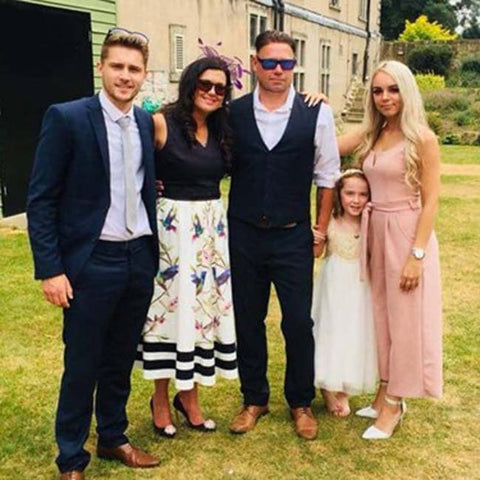
We are also extremely close to Dave’s dad Bob. He is a tower of strength, having fought off bladder cancer twice. Dave lost his mum Judy to ovarian and peritoneal cancer on New Year’s Eve 2018. Bob’s partner Val has been an amazing support too. Little did we know back then just how much we’d come to rely on our wonderful family in the coming months. 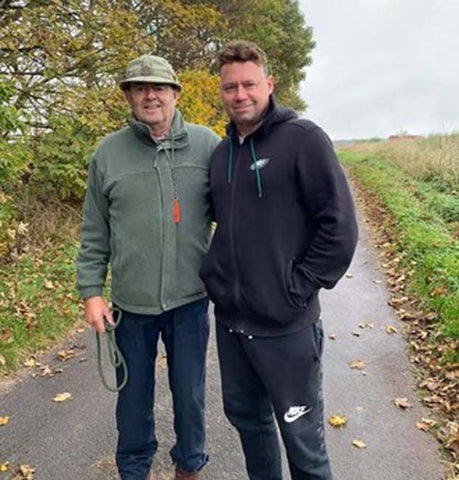
On 14ᵗʰ August 2020, Dave was playing badminton with Lydia, when he noticed a flicker in his eye. He initially put it down to dehydration, as it was a very hot day. But over the coming days, a dull feeling developed in his head and the flicker didn’t go away. A visit to the doctors led to him being diagnosed with migraines but as the symptoms continued over the next two weeks, he went to get checked out at Scunthorpe General Hospital A&E. I had a feeling that something wasn’t right, as Dave was never one to complain of illness and even going to the GP was unusual for him.
Due to COVID-19 restrictions, he went in alone. They listened to his concerns and sent him for a CT scan. He was on his own when, at 6pm the same evening, the terrible news came like a thunderbolt. They had found a tumour in his brain. Dave called to tell me he was being admitted and asked if I could bring in an overnight bag. When I arrived at the hospital, I wasn’t allowed to go inside, so Dave came to meet me at the main doors. It was there that he had to deliver the news that he had a brain tumour. It was horrific. I was in complete shock and I just wanted to stay with him but I couldn’t.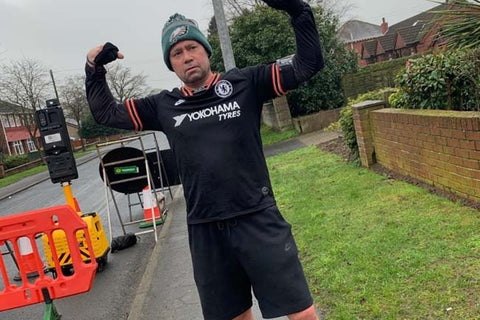
I left Dave and went off on my own to ring his dad and the kids. They were all as devastated as I was.
Dave was transferred to Hull Royal Infirmary where the doctors laid out the plan. He was to have surgery within a week, during which they would debulk the tumour and take a sample to perform a biopsy, the results of which would help to determine the next steps. Dave’s operation went well. The staff were incredible and within two days he was home, fighting to get back to full fitness. Dave has always been into his sport and exercise. He’d go to the gym regularly and ate a healthy diet. He enjoyed a drink socially but didn’t lead an unhealthy life whatsoever.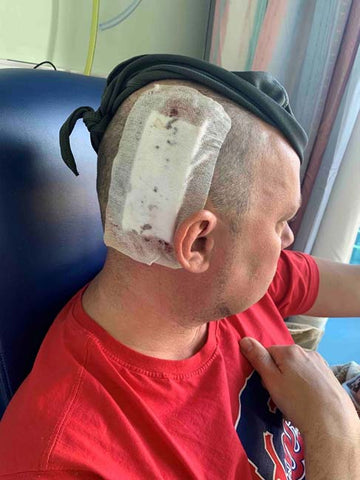
Two weeks after Dave’s surgery, he got the biopsy results, which confirmed he had a grade 4 glioblastoma – the most aggressive form of brain cancer – and the statistics were not good. At best, we could hope for 12 to 18 months. Without surgery, we’d have lost him in less than six months. We were not prepared to accept these statistics, as every person's brain tumour journey is different.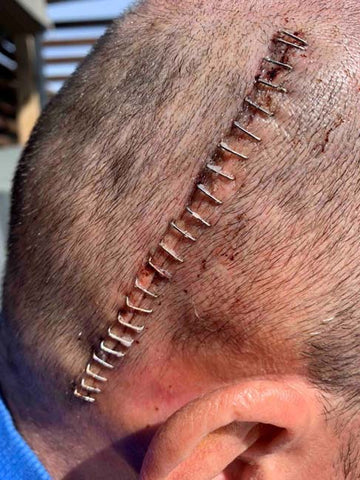
When the swelling had reduced following his operation, Dave underwent six weeks of intensive radiotherapy and chemotherapy. The next stage would be six cycles of chemotherapy for five days every month. Meanwhile, I began to research every possible avenue, in the hope of finding alternative private treatments, both in the UK and abroad, which would give Dave the best chance of survival. I read the stories of other people in the same situation and by joining online groups and forums, I came across treatment at the IOZK clinic in Cologne in Germany, which creates personalised immune therapy to strengthen a patient’s immune system. The consultants we spoke to in this country were behind us pursuing this route, especially since other options we looked at in the UK were not suitable.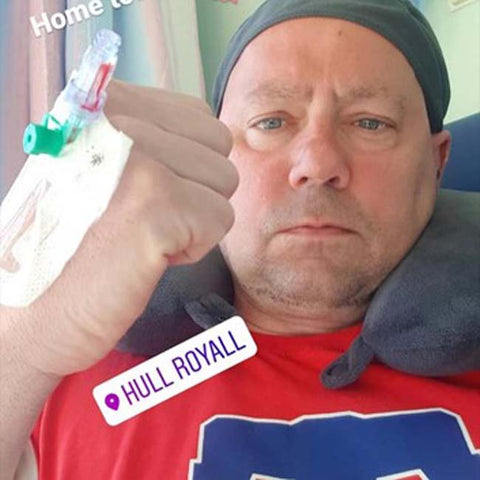
Unfortunately, however, this treatment would come at a huge cost – around £150,000 – and we would need to fund it ourselves.
I work as a national relationship manager for a company providing vocational training to the care sector and Dave has worked as a technician for Phillips 66 oil refinery since leaving school. We knew that in order to raise that sort of money, we would need to rely on the support and generosity of our amazing friends, family and the wider Scunthorpe community. Somewhat reluctantly, we set up a crowdfunding page and were amazed at how quickly the donations began flooding in.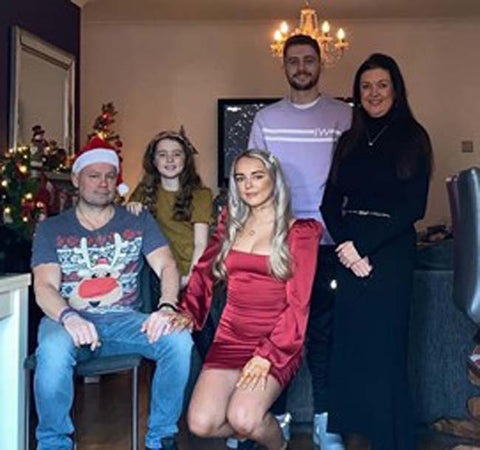
In early January 2021, after finishing his second cycle of chemotherapy, Dave and I finally made it on a plane to Germany, following a very anxious and stressful few weeks trying to organise our COVID tests and travel documents, so we could make the trip during the pandemic. We were even held up at check-in, where the Eurowings staff told us we wouldn’t be able to board. Through sheer determination, we made it onto the aircraft by the skin of our teeth.
When we arrived in Germany, the border control staff were amazing and accepted Dave’s medical certificate without any issues. We then ventured by train to Cologne and made our way to the clinic, where we met Professor Stefaan Van Gool, who discussed the treatment process and how this would potentially help to prolong Dave’s life. We were so impressed and really believed that we’d made the right decision.
We returned to England and Dave resumed his chemotherapy, coping with it admirably well even though he had some challenging side effects, including swelling. He continued exercising and running 5ks throughout.
Dave’s first course of treatment in Germany began on 18ᵗʰ January 2021. It went well and he didn’t suffer from side effects, other than a bit of tiredness but in true Dave fashion, it didn’t faze him. Meanwhile, the fundraising continued apace and by the end of January, we’d raised more than £42,000. This was completely overwhelming and we couldn’t thank our supporters enough for making the private treatment possible in what were such difficult times for everyone, as we were still in a national lockdown.
We were also extremely grateful to our MP, Holly Mumby-Croft, who, on 27ᵗʰ January 2021, spoke about Dave’s diagnosis in parliament and raised a Prime Minister’s Question (PMQ) about whether the PM would work with Brain Tumour Research to help improve research and treatment options for patients like Dave. She highlighted that while the Department of Health is working with charities on addressing the issue, there is still much more to be done.
The following month, Dave had a tough time, as he started suffering with bad headaches. It meant that he had to increase his dosage of steroids, in order to get on top of them and ensure he was well enough to travel to Germany for his next round of treatment. In the end, it was touch-and-go as to whether he’d be able to go but luckily, his consultant gave him the go-ahead and we arrived in Cologne on 14 February, ready to start his second cycle of immunotherapy.
Dave had his first post-radiotherapy MRI scan on 24ᵗʰ February. The scan images showed some swelling, which wasn’t necessarily bad news, as the doctors thought it could have been pseudo-progression, rather than tumour growth. We didn’t panic. The plan was to scan again in six weeks’ time and to monitor for any new symptoms. Meanwhile, we began pursuing another line of private treatment at CeGaT clinic in Tübingen, Germany. A sample of Dave’s tumour was sent to the clinic for analysis, in order for them to develop a NeoPeptide vaccine, which we again hoped would help extend Dave’s life.
With the cost of frequent trips overseas mounting, we were once again extremely grateful to Holly Mumby-Croft MP, who raised the issue of people travelling abroad for medical treatment having to pay hundreds of pounds for COVID tests.
She asked the then Health Secretary, Matt Hancock, if he would work with the Secretary of State for Transport urgently to find a way to allow patients such as Dave to use free NHS tests for medical travel purposes. The other impact of COVID was that it was precluding Dave from having lots of quality time with friends and family. We were desperate to be making memories for him but the pandemic put paid to those plans, making the situation all the more challenging.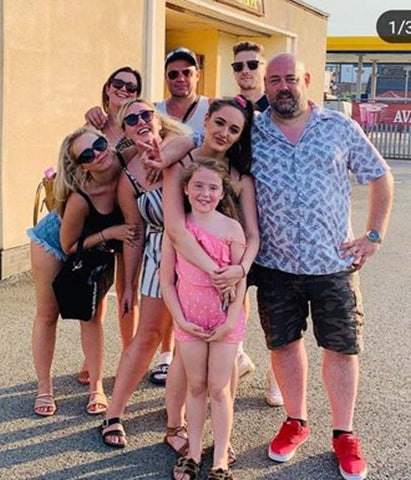
At the beginning of April 2021, Dave had his MRI scan to follow up from the inconclusive scan results in February. This scan revealed tumour progression. We had a discussion with the consultant and he offered to operate as soon as possible. We chatted to the clinic in Germany and got a second opinion from a private consultant in the UK and everyone agreed that it was a case of, ‘the sooner, the better’. Dave’s surgery went ahead on 21 April and again, he coped very well and was home within two days and was back walking and doing the school run. He was amazing.
Meanwhile, the CeGaT clinic in Tübingen had identified 23 peptides suitable for Dave and we went ahead and paid £30,000 for the NeoPeptide vaccines, which would take a few weeks to be developed.
One Sunday in May, Dave, Sydney and I were invited out on our friend Kev’s boat, for a trip along the Humber. We agreed to go, as Dave had been feeling well. Once we got on board, we were relieved that he seemed fine and we were all having an amazing time. However, all of that changed when, out of the blue, Dave suffered a seizure. Sydney was sitting next to him at the time and had to witness it. Kev safely docked the boat and we called the emergency services. Eventually, an ambulance came and took Dave to Castle Hill Hospital. A scan confirmed there’d been no more tumour progression, which was a great news, and he was put on anti-seizure medication.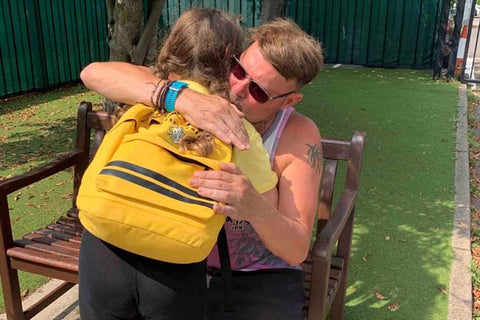
In July 2021, Dave was due to start taking Avastin, a type of monoclonal antibody drug currently used in the UK for glioblastoma. In order to have the drug administered, he would have to travel to London. However, two days before this treatment was scheduled to begin, he suffered multiple seizures and it was put on hold. Luckily, the Avastin was then authorised to be given in Hull, rather than London. Once he started taking it, we noticed an improvement straight away; he was walking around without feeling dizzy and was able to enjoy more time with the kids.
Later that month, however, we got the results from Dave’s most recent MRI scan, which revealed more tumour progression. They said it was inoperable and unresponsive to the chemotherapy he’d been having. We had exhausted all treatment options on the NHS and there was nothing more they could do.
This was a massive blow but we were not ready to give up. The consultant I was in touch with in London recommended a new plan, which would involve Dave taking a checkpoint inhibitor called Keytruda, a drug that blocks proteins that are made by some types of immune system cells and some cancer cells. It would cost £7,000 per cycle and would be delivered by infusion every three weeks. Meanwhile, in August, the NeoPeptide vaccine treatment in Germany got underway and despite ‘looking like he’d been shot several times’, Dave completed his first four vaccines without any problems. 
But his condition began to deteriorate, and on 6 November 2021, Dave died with his loving family by his side.
He has left a huge hole in our lives, but we are determined to fundraise in his memory for Brain Tumour Research. It’s so important to us as a family to continue to raise awareness and help find a cure. David’s eldest daughter Lydia is also passionate campaigner for the charity.
On Friday 25ᵗʰ March 2022, North Lincolnshire Council lit up its Church Square House pink and yellow in celebration of Brain Tumour Research’s Wear A Hat Day. It was very emotional to see the building lit up in the charity’s colours. Did would not have expected that!
On the same day, all of the pupils at my daughter Sydney’s school - Bottesford Primary – wore hats to raise money.
I feel overwhelmed that everyone in the community is behind us. We’re forever grateful to the people of Scunthorpe for what they’ve done for us.
The GoFundMe page has now passed £110,000, which is just incredible and we can never thank everyone enough for their support.
I will continue working with Brain Tumour Research to help raise awareness of this critically underfunded area of cancer research. I owe it to my wonderful husband and to all the other amazing brain tumour patients and their families who I’ve met on this journey so far.
Nicki Hopkins
September 2021
One in three people in the UK knows someone affected by a brain tumour. This disease is indiscriminate; it can affect anyone at any age. What’s more, brain tumours continue to kill more children and adults under the age of 40 than any other cancer yet, to date, just 1% of the national spend on cancer research has been allocated to this devastating disease since records began in 2002.
Brain Tumour Research is determined to change this.
If you have been touched by Dave's story, you may like to make a donation via www.braintumourresearch.org/donate or leave a gift in your will via www.braintumourresearch.org/legacy
Together we will find a cure.

